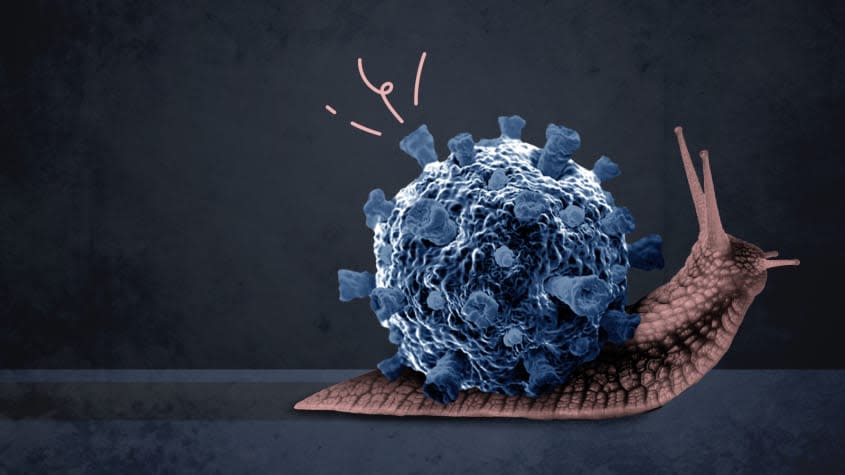What the CDC's new study tells us about long COVID

A new report from the U.S. Centers for Disease Control and Prevention suggests that over 1 in 5 COVID-19 survivors under the age of 65 could develop long COVID. And those odds increase the older you get — among patients 65 and older, 1 in 4 could develop the protracted symptoms associated with the condition, the study found. Here's everything you need to know:
What is long COVID?
"Long COVID" refers to the long-term health effects of a coronavirus infection, including lingering fatigue, respiratory and heart symptoms like difficulty breathing and chest pain, neurological symptoms like headache and brain fog, and digestive and other symptoms like stomach, joint, or muscle pain, per the CDC. These "post-COVID conditions," as the agency refers to them, are most often found in those who had a serious bout of COVID — but anyone recovering from infection is susceptible.
Symptoms are typically first identified about four weeks after the initial infection, and can then last weeks or even months before maybe going away or perhaps coming back again. Additionally, long COVID might not affect everyone the same way, often making it difficult for those suffering, as well as their health care providers, to make a diagnosis. Unfortunately, the vaccine might not make much of a difference on this front — a large U.S. study published Wednesday suggests coronavirus inoculation has only a "slight protective effect" against long COVID, The Washington Post writes. Though it seems to reduce the risk of lung and blood clot disorders, the vaccine doesn't protect much against the condition's other symptoms, the study found.
All in all, it's important to note there's also still much unknown about long COVID, so findings and understandings regarding the condition might change.
Is long COVID a big deal?
Absolutely.
"This is real, definable, and causes significant patient suffering," Bruce Levy of the Brigham and Women's Hospital in Boston told the Post in February, referring to long COVID. "The majority of people who got acutely infected felt totally normal before they had their infection, and now they don't feel normal. That's jarring."
Why does it happen?
Scientists aren't entirely sure... but they do have some ideas. Some experts believe that an intense immune response during a primary COVID infection may lead to inflammation and damage throughout the body, eventually resulting in long COVID, The New York Times reports. Another theory is that the immune system never really shuts down after the initial infection.
How is it diagnosed?
At the moment, given the condition's wide array of symptoms, doctors must rely on patient descriptions and process of elimination to diagnose long COVID, reports the Times. To hopefully clarify the process, researchers are working to identify certain biomarkers that correspond to certain post-COVID conditions, like inflammation.
What did the CDC's report say?
The large study, published online on May 24, found that one in five previously-infected adults under the age of 65 has experienced at least one symptom that could be considered long COVID. In those older than 65, that breakdown increases to one in four. And, "in an indication of how seriously the [agency] views the problem of long COVID," writes the Times, the authors of the study recommended "routine assessment for post-COVID conditions among persons who survive COVID-19."
For both age groups — above and below 65-years-old — COVID patients' risk of developing respiratory symptoms and lung problems doubled compared to uninfected individuals, the study found. Meanwhile, those above 65 were at greater risk of developing kidney failure, neurological conditions, and a number of mental health conditions than their younger counterparts. Regardless of age, the most commonly reported post-COVID infection symptoms were respiratory issues and musculoskeletal pain.
The study did not incorporate patients' vaccination status, nor did it report certain demographic information, like race, ethnicity, sex, or location. It also did not identify which virus variants were connected to each case, the Times notes.
Notably, researchers concluded that long COVID might "affect a patient's ability to contribute to the work force and might have economic consequences for survivors and their dependents." The study's results could "potentially translate into millions of people with new diabetes, heart disease, kidney disease, neurologic problems," epidemiologist Dr. Ziyad Al-Aly, who was not involved in the research, told the Times. "These are lifelong conditions — certainly manageable, but not curable conditions."
Is there a treatment for long COVID? Can you cure it?
Unfortunately, there is no cure for long COVID — at least not at the moment. There are, however, certain steps long COVID patients can take to hopefully ease and treat their symptoms. For starters, make sure to talk to your primary care doctor; if you're concerned that what you're feeling is COVID-related, there's no need to wait. Otherwise, you might check out a post-COVID clinic, a number of which are cropping up nationwide and offer multidisciplinary and individualized care, both the Times and the Post report. Be warned, however; accessing a clinic might mean out-of-state travel, and can be difficult to do depending on your insurance.
Experts have also indicated that, in addition to symptom-specific treatment, "rehabilitation through low-paced gradual increases in activity is key to recovery," the Post writes. Overall, experts advise remembering that healing isn't linear and will take time.
You may also like
What the CDC's new study tells us about long COVID
At least 7 killed in mass shootings over Memorial Day weekend

